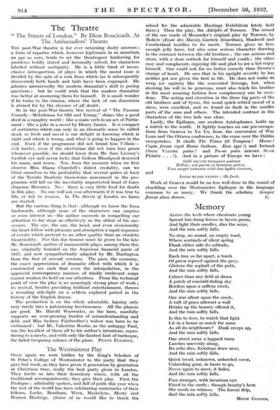The Westminster Play
ONCE again we were bidden by the King's Scholars of St Peter's College of Westminster to the party that they gave last week, as they have given it generation by generation at Christmas time, really the best party given in London. They invite us into their dormitory where, with all the traditional accompaniments, they give their play. First, the Prologue ; admirably spoken, and full of pride this year when the rest of the world has been celebrating centenaries of their fellows, Locke, Bentham, Wren, Maskelyne, Henty and Warren Hastings. (Some of us would like to thank the school for the admirable Hastings Exhibition lately held there.) Then the play, the Adelphi of Terence. The record of the use made of Menander's original play by Terence, by Moliere (Ecole des Maris), Garrick (Guardian), Shadwell and Cumberland testifies to its merit. Terence gives us here enough jolly farce, but also some serious character drawing in the contrast between the old brothers ; the one serious and stern, with a dour outlook for himself and youth ; the other easy and complacent, enjoying life and glad to see a lad enjoy himself. One could ask for no better comedy than Demea's change of heart. He sees that in his upright severity he has neither got nor given the best in life. He does not make rig weep (or squirm) like the converted Scrooge, but, when showing his will to be generous, must also teach his brother in the most amusing fashion how complacency can be over- done. The acting and elocution in the three big parts of the old brothers and of Syrus, the usual quick-witted rascal of a slave, were excellent, and we found no fault in the smaller parts of the sons and others. The intended contrast in the characters of the two lads was clear.
Lastly, the Epilogue, our modern Aristophanes, holds up a mirror to the world. It lightly touches on our pre-occupa- tions from Geneva to Yo Yo, from the conversion of War Loan and the Ottawa conference, to the craze over the Dublin sweepstakes. It chaffs The Times (0 Tempora ! Mores ! Capta ferum cepit Roma Gothum. Ecce typi !) and Ireland (Innn VALERE putas? and Tu-ne potes nescIRE Su AE Pietatis . . . ?). And in a picture of Europe we have : Galli SECURI Tympana pulsant Bellica ; aed pacem 81 atorcueve pairs.", Turin aurgIT LERnaea velut dux hydra tirorum, Iralu8 muss° LENiter : ille furit.
Work at Geneva would be no less well done to the sound of chuckling over the Westminster Epilogue in the language common to so many. We thank the scholars. Semper
and






























 Previous page
Previous page